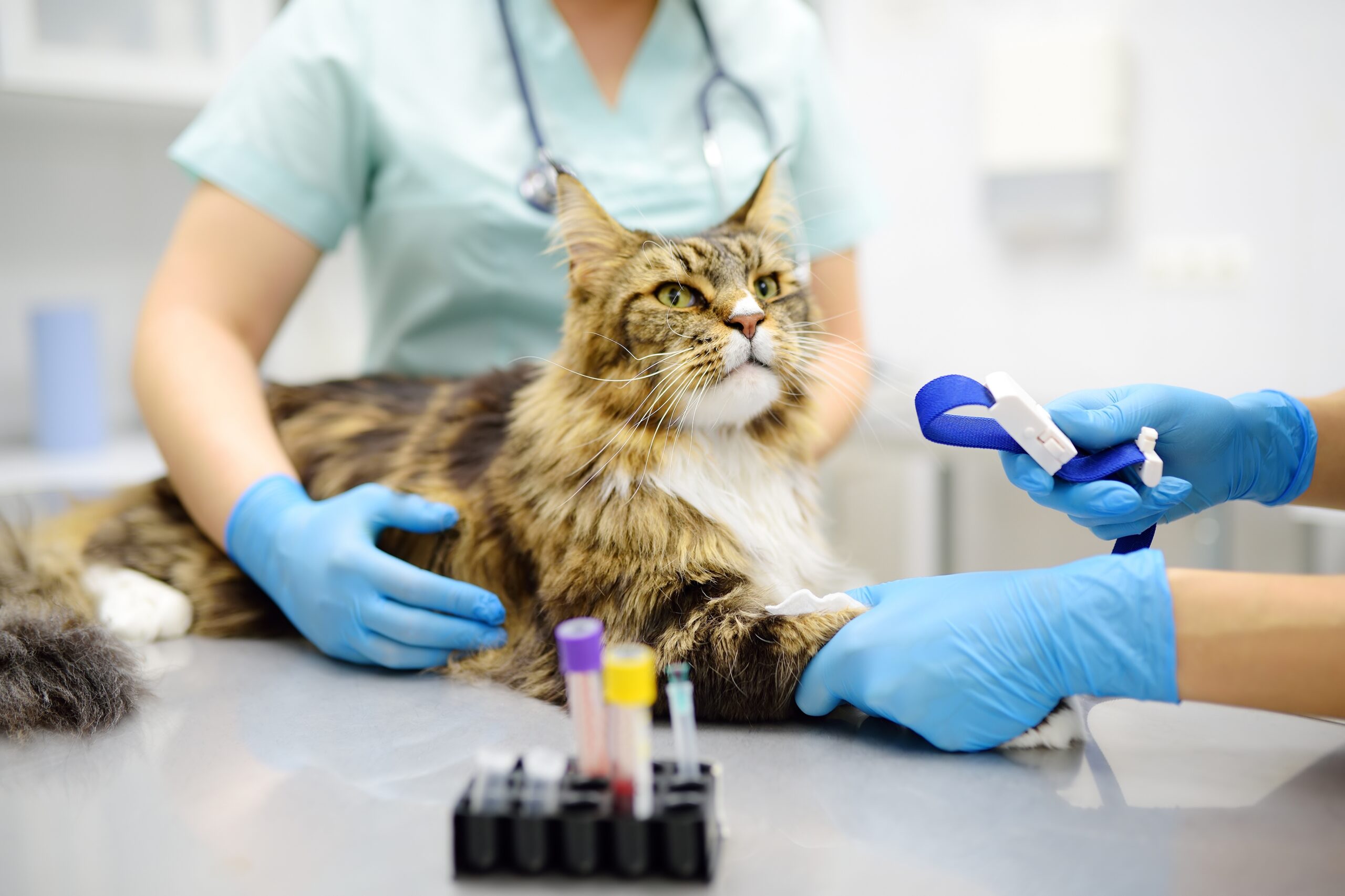Key Points
- Blood tests help veterinarians diagnose or rule out conditions like kidney disease or diabetes in your cat, allowing for quicker and more effective treatment.
- All cats and older kittens should get their blood tested at least once to rule out FeLV and FIV, two common viral diseases that can spread and sicken other cats. Make sure to do this before you introduce new cats to your fur family!
- Pumpkin Wellness Club can help you save on your cat’s preventive care, including blood testing and vaccinations, with cash payments and access to discounts on top pet products.*
You may feel a twinge of secondhand anxiety when your cat gets their blood drawn, but that brief prick is worth any temporary discomfort.
A diagnostic blood test can reveal health issues your pet can’t tell you about, like diabetes, kidney disease, and hyperthyroidism. Routine blood testing also helps your veterinarian establish a wellness plan that’s tailored to your cat’s unique needs.
Kittens need blood testing in their first year to screen for feline leukemia (FeLV) and feline immunodeficiency virus (FIV), two infectious and incurable diseases that are contagious to other cats. The best way to prevent these illnesses is by testing and vaccinating new cats and kittens.
How often your cat needs a blood test depends on their age, existing health conditions, and lifestyle factors (mainly whether your cat spends time outside or prefers to stay indoors). Even if your cat seems like the purr-fect picture of health, you should still ask the veterinarian about blood testing at the annual wellness check-up, as many diseases are “silent” in the early stages.
Plus, Pumpkin has introduced a new program to help you plan ahead and save on the cost of your pet’s preventive care. As a member of the Pumpkin Wellness Club, you get paid up to $100 cash for your cat’s annual vet visit (you know, the one that’s not covered by pet insurance) and can save even more with access to discounts on top pet products.
When does a cat need a blood test?
Most veterinarians will recommend blood testing at your cat’s annual wellness exam. While some feline ailments — such as an eye infection or skin irritation — may be obvious to the vet during the physical exam, a blood test provides additional information about your cat’s health.
Blood testing helps the veterinary team plan ahead for your cat’s health needs at every stage of their life. As your cat gets up into their golden years, they can benefit from more frequent blood tests to manage any existing health conditions and monitor for indicators of disease.
Here’s when you can expect your cat to need blood testing throughout their lifetime:
At the first veterinary visit, your veterinarian will review your cat’s medical records, and if they haven’t been tested for FeLV and FIV, will recommend they be tested. Depending on the age of your cat, the vet may also recommend routine blood testing to check blood cell health and internal organ function. If you have a kitten, your veterinarian will let you know the best age to have your kitten tested for FeLV and FIV.
At annual wellness exams, the veterinarian may recommend routine blood tests including a complete blood count and a biochemistry panel (internal organ function testing), depending on your cat’s age and health needs.
As your cat matures (7-10 years and older), your vet may recommend increasing the frequency of blood testing to twice-yearly. This helps them monitor your cat’s organ function as they age and catch problems sooner.
If your cat needs surgery, your veterinarian will order blood tests to ensure your cat can safely undergo anesthesia.
At any point, if your cat is acting weirder than usual (e.g., changes in appetite, hiding, or litter box habits) you can take them to the vet to figure out what’s wrong. If a physical exam doesn’t reveal the problem, the vet may order a blood or urine test to learn more.
Keep in mind that cats with special health needs may need more frequent blood testing. If your cat has hyperthyroidism, for instance, they will need regular testing to check on their thyroid hormone levels.
What to expect during your cat’s blood test
Blood tests are relatively simple diagnostic screenings that veterinarians commonly use to check a pet’s health. While your cat might not love the time spent on the exam table, it’s really a quick and non-invasive way to rule out or diagnose many health problems.
If your cat needs a blood test, a veterinary professional (likely a technician) will help restrain them while another team member draws blood from a vein either in the leg or neck. They’ll draw the amount of blood needed, and it’ll be over in a snap — sometimes cats don’t even notice!
The veterinary pro will apply pressure to the puncture site after the blood draw to prevent excessive bleeding or a hematoma — a solid swelling of clotted blood within the tissues. They may put a temporary wrap on the puncture site that needs to be removed within 10 minutes, or they may not — they will let you know what to do either way.
Depending on the blood test, your cat’s blood work results will be ready for you anywhere from 30 minutes up to a week after the appointment. The length of time it takes to get results depends on whether the blood tests can be run in the hospital or if the blood has to be sent to a lab.
Depending on your cat’s age and health status, your veterinarian may recommend one or more of these blood tests:
Most common feline blood tests:
- Complete blood count (CBC): A CBC checks on the number, size, and type of your pet’s red blood cells, white blood cells, and platelets. It can also detect blood parasites.
- Biochemistry profile/basic metabolic panel (BMP): A biochemistry profile checks your pet’s internal organ function, electrolyte levels, blood sugar, and certain enzyme levels.
- Retroviral testing: Cats need blood testing to rule out the retroviruses FeLV and FIV at least once in their lifetime, usually at their first vet exam.
- Thyroid panel: A thyroid panel checks your pet’s thyroid function. Thyroid problems are more common in senior cats, so a veterinarian may recommend this test as your cat gets older.
- SDMA: Symmetric dimethylarginine (SDMA) is a sensitive biomarker for kidney function that can detect kidney disease much earlier than older tests.
Additional blood tests for cats:
- Heartworm Antibody Testing: Heartworm infections are notoriously difficult to diagnose in cats compared to dogs. However, the heartworm antibody test can detect heartworm disease in cats with greater sensitivity compared to other forms of testing, and it is recommended in regions that have high prevalence of heartworm disease.
- Gastrointestinal (GI) panel: This test can detect abnormalities in the blood associated with diseases like pancreatitis.
- Allergy testing: Blood tests are also available to help show the environmental substances that may be causing a pet’s allergy symptoms. However, skin testing is recommended first as it is more sensitive and specific.
- Genetic testing: Genetic testing can reveal your cat’s ancestry and determine whether they have any risks for genetic diseases.
Understanding your cat’s blood test results
Blood testing is important not only for establishing your pet’s baseline vitals, but also for getting a head start on diagnosing and treating common conditions that can make your cat sick.
Your cat’s blood work holds a ton of key information about nearly every organ in the body, so the results may be overwhelming for pet owners unfamiliar with medical terminology. Don’t panic: The veterinarian or their team will walk you through the most important findings and make recommendations for treatment.
What does a blood test show for a cat?
With that being said, here are some common indicators of health issues that might show up on your cat’s CBC panel (the standard blood panel).
- Anemia: indicated by a low red blood cell count
- Infection, inflammation, stress, or cancer: indicated by a high white blood cell count
- Bleeding condition, autoimmune disease: indicated by a low platelet count
Interpreting CBC results is fairly simple, at least compared to other blood panels. There are normal reference levels for cats, just like there are for dogs, humans, and other mammals.
For other blood tests — those that measure thyroid hormone, blood sugar, or other indicators of organ function — the veterinarian will look at your cat’s past results to identify any significant changes over time. This is one of the reasons why blood work is a key part of preventive care for cats: understanding your pet’s baseline when they’re healthy makes it easier to tell when they’re sick.
Blood test indicators of common diseases in cats
Some blood panels measure levels of hormones or chemicals in the blood that correspond with specific organs, as a way to monitor organ function. This is particularly helpful in senior cats.
Here are some common disease indicators that may show up in your cat’s blood test results:
- If your cat has high blood sugar levels, it could be a sign of feline diabetes.
- If your cat has high levels of the thyroid hormone T4, they likely have hyperthyroidism. Or, if their thyroid hormone levels are lower than average, the condition is called hypothyroidism.
- Thyroid disorders are relatively common in older cats and dogs, and may cause unexpected weight loss or weight gain. Luckily, these disorders can be managed with medication or surgery.
- If your cat has low albumin levels, it could indicate possible liver or kidney disease, or an intestinal issue. Albumin is produced in the liver, and is lost via kidney or intestinal dysfunction.
- Higher-than-normal levels of this liver enzyme indicate liver inflammation or damage.
- If your cat has high creatinine and BUN — waste products that are normally eliminated by the kidneys — it may indicate kidney disease.
Baseline blood testing helps the veterinary team establish what’s normal for your cat. The idea here is to get a full overview of your pet’s internal chemistry. While your cat might seem like the picture of health on the outside, analyzing their blood is a surefire way to rule out any hidden illnesses or early signs of diseases.
How much does blood work cost for cats?
Blood tests can vary greatly in price, depending on whether your cat needs routine blood work or a specialized panel. Routine blood work, which includes a CBC and biochemistry panel, typically costs between $100 and $200 depending on where you get it done.
More specialized blood tests — a thyroid panel, retroviral testing, or heartworm screening — can range between $35 for a heartworm test and $150 for a thyroid panel. Depending on whether the test is diagnostic or preventive, it may or may not be covered by pet insurance.
Traditional pet insurance plans can help you cover the cost of diagnostic blood tests if your pet gets sick or hurt in the future. But for preventive bloodwork, you might want to consider a program like the Pumpkin Wellness Club to help you save on costs. One membership option offers members $75 per year for preventive blood testing, plus more cash to put towards vaccines and other wellness care, and access to special discounts on top pet products.
DISCLOSURE





